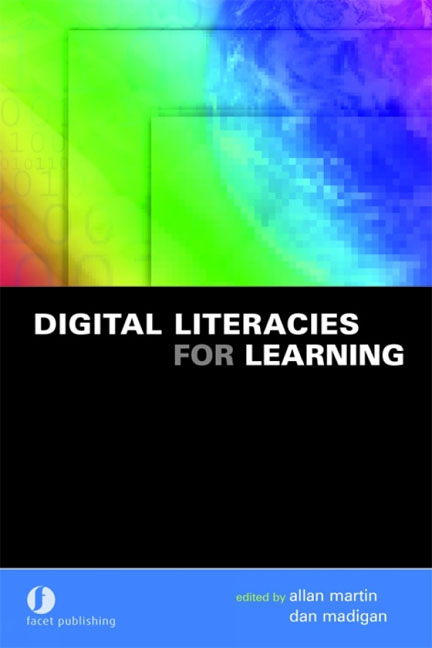Book contents
- Frontmatter
- Contents
- Dedication
- The contributors
- Foreword
- Preface
- Part I Literacies in the digital age
- 1 Literacies for the digital age: preview of Part 1
- 2 Learners, learning literacy and the pedagogy of e-learning
- 3 Real learning in virtual environments
- 4 Digital fusion: defining the intersection of content and communications
- 5 Literacy and the digital knowledge revolution
- 6 Understanding e-literacy
- 7 Information literacy – an overview
- 8 Contemporary literacy – the three Es
- 9 Reconceptualizing media literacy for the digital age
- 10 Literacy, e-literacy and multiliteracies: meeting the challenges of teaching online
- 11 Graduate e-literacies and employability
- Part II Enabling and supporting digital literacies
- Index
6 - Understanding e-literacy
from Part I - Literacies in the digital age
Published online by Cambridge University Press: 08 June 2018
- Frontmatter
- Contents
- Dedication
- The contributors
- Foreword
- Preface
- Part I Literacies in the digital age
- 1 Literacies for the digital age: preview of Part 1
- 2 Learners, learning literacy and the pedagogy of e-learning
- 3 Real learning in virtual environments
- 4 Digital fusion: defining the intersection of content and communications
- 5 Literacy and the digital knowledge revolution
- 6 Understanding e-literacy
- 7 Information literacy – an overview
- 8 Contemporary literacy – the three Es
- 9 Reconceptualizing media literacy for the digital age
- 10 Literacy, e-literacy and multiliteracies: meeting the challenges of teaching online
- 11 Graduate e-literacies and employability
- Part II Enabling and supporting digital literacies
- Index
Summary
Abstract
The technological changes which have infused almost every aspect of our lives have raised new questions and issues about what it means to be literate. ‘E-literacy’ is a relatively new term, created to attempt to capture the converging and emerging literacies necessary to function in the digital age, including, in particular, information and computer literacy. In this chapter, the author proposes that academic literacy be included in the definition of e-literacy and discusses some key components of the three literacies that e-literacy would then incorporate. By examining areas of convergence between academic literacy and information and computer literacy, some previously unrecognized commonalities are illuminated. The implications of these commonalities for learning support in a higher education context are discussed.
Introduction
‘E-literacy’ is a relatively new term, created to attempt to capture the converging and emerging literacies necessary to function in the digital age. The organizers of the eLit2003 Conference defined e-literacy as a combination of information and computer literacy (eLit, 2003). This chapter unravels some of the concepts incorporated by the term e-literacy and proposes that, to achieve a more comprehensive understanding of e-literacy, an additional skill set needs to be considered as part of the e-literacy equation – academic literacy.
The first part of this chapter examines the meanings of the three literacies of which e-literacy is comprised in order to arrive at the definitions which underpin the rest of the chapter. The second part explores some of the key connections between academic literacy and information and computer literacy. This approach is more focused than the work of Bawden (2001), to which readers can refer for a detailed review of information and digital literacies. My perspective is also different. Although I work in a university library, I am not a librarian; but as a learning professional, I have an interest in the evolution and merging of literacies relevant to student learning.
The connections between academic literacy and computer and information literacy have received little recognition from researchers or university professionals. Because this recognition has been lacking, the links and overlaps between academic literacy and information and computer literacy have not been exploited to the mutual benefit of staff, faculty and students. By exploring some of these commonalities, this chapter aims to promote a richer understanding of e-literacy.
- Type
- Chapter
- Information
- Digital Literacies for Learning , pp. 68 - 79Publisher: FacetPrint publication year: 2006
- 3
- Cited by



